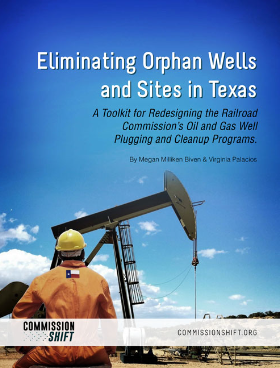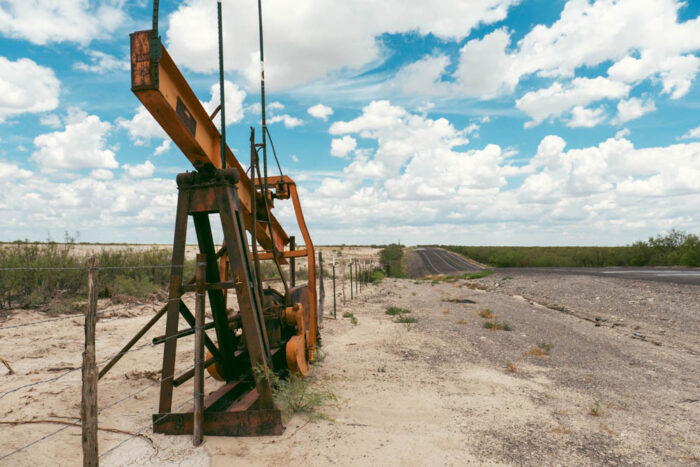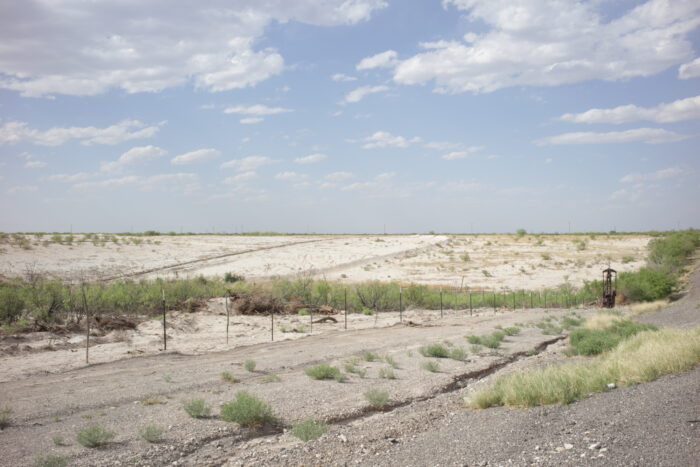The railroad commission — whose oversight is focused on oil and gas, not trains — said in a Monday statement that protecting groundwater was a major driver for the decision to start the process of updating existing, mandatory rules on waste pits.
“One of the highest priorities of the Railroad Commission of Texas … is the protection of groundwater resources,” commission officials wrote in the statement, adding that the proposed revisions “reflect the Commission’s mission to serve Texas through our stewardship of natural resources and the environment.”
The rules were last updated in 1984 — about 30 years before hydraulic fracturing, or fracking, began to transform the oil and gas industry and generate millions of barrels of excess wastewater each year. Patty Ramon, a spokesperson for the Railroad Commission, said a previous attempt to change the rules in 2002 was not completed.
There are waste pits near virtually all drilling sites, said Hugh Daigle, an associate professor of petroleum engineering with the University of Texas, Austin.
“Any time you are exchanging fluids between the surface and subsurface, it helps to have a temporary reservoir to store things,” he said.
A major point of contention has been the pits’ lining to prevent waste liquid from seeping into nearby earth or leeching into groundwater. Currently, operators are not required to use synthetic liners.
Daigle said the newly proposed rules go into much more detail about what can and cannot be used in liners and set new standards for what materials can be used. It also has more specifics on how to design berms that surround the pits and what operators must do when waste is removed from them.
Some of the rule changes were mandated through laws passed in the past few years by the Texas Legislature, including measures requiring the Railroad Commission to adopt rules governing where pits can be located, updating definitions for what constitutes a drill cutting, and making new rules to encourage waste recycling.
The pits hold a range of waste: salty water that comes up from below the surface; fracking liquid, which is water mixed with things like friction-control additives, polymers and poisonous biocides to prevent bacteria growth in wells; oil-based drilling fluid, which can contain diesel; and little pieces of rock called drill cuttings, which can contain oil and gas residue.
The Texas Oil and Gas Association, the state’s major industry trade group, did not respond to requests for comment about the commission’s plan.
The pits are simple in design, according to Daigle. Construction workers dig holes and outfit them with plumbing and pipes to take the waste from its origin point to the pit.
If the clay in the dirt on the edges of the pits is deemed thick enough, that alone can be used as liners under existing regulations, said Daigle and Virginia Palacios, executive director of Commission Shift, a nonprofit group that advocates for changes within the Railroad Commission.
“There’s not a lot of strong guarantees that these soil or clay liners are actually going to hold up and prevent waste from leeching into the aquifers,” she said.
Palacios pointed to Louisiana and New Mexico, which she said have stronger requirements for liners. She said states neighboring Texas also have stricter rules about testing for harmful chemicals before they are allowed to be put into waste pits and have statewide set-back requirements that mandate the pits be kept a certain distance from homes or infrastructure.
The disparate regulations have led operators in neighboring states to ship their waste liquids to be stored in Texas, Palacios said, compounding the problem.
Some of the proposed rules from the commission are not entirely new. Its staff members have used a guidance document for years when issuing permits for waste pits, which included some of the standards in the new rules. Codifying them could make the process less subjective, Daigle said.
The commission will accept comments for the proposed new rules until Nov. 3. It will hold a public hearing on the issue in Austin and a separate virtual meeting.
Ramon with the Railroad Commission said “interested parties are encouraged to attend and provide oral or written comments regarding the proposed changes under consideration. The new proposals are already posted on the RRC website available for informal public comment.”
But Palacios said it will be hard for residents directly impacted by waste pits to offer feedback because they live hours from the state capital and may not have easy access to broadband internet in rural areas.
Still, if the rules are adopted as written, Daigle said it could help avoid some environmental problems.
“Looking at how specific they are here in designs and liners, to me it seems like this is going to make a big difference — if everything is adhered to,” he said. “The Railroad Commission is always granting exemptions, but as long as everybody does this, it will make a big difference in reducing groundwater contamination.”




